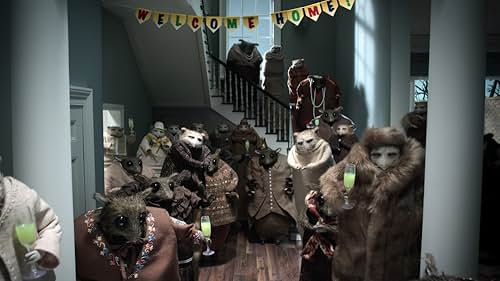
Trailer
Netflix has dropped the trailer for its upcoming adult stop-motion anthology special “The House,” produced by U.K.-based Nexus Studios and coming to the streamer on Jan. 14. The special features three unconnected stories which Netflix described as an “eccentric dark comedy” when it was presented at Annecy in June. The stories centers around a single house in three realities, and those who live there. In the trailer, we meet some of the human and animal inhabitants and get a taste of the program’s blood-cooling aesthetics and tone.
The special is loaded with top-tier talent. Chapter one is directed by Belgian auteurs Emma de Swaef and Marc James Roels (“This Magnificent Cake!”), Chapter two by Swedish director Niki Lindroth von Bahr (“The Burden”) and Chapter three by Paloma Baeza (“Poles Apart”). The voice cast boasts a start-studded lineup including Mia Goth, Matthew Goode, Claudie Blakley, Mark Heap, Joshua McGuire,...
Netflix has dropped the trailer for its upcoming adult stop-motion anthology special “The House,” produced by U.K.-based Nexus Studios and coming to the streamer on Jan. 14. The special features three unconnected stories which Netflix described as an “eccentric dark comedy” when it was presented at Annecy in June. The stories centers around a single house in three realities, and those who live there. In the trailer, we meet some of the human and animal inhabitants and get a taste of the program’s blood-cooling aesthetics and tone.
The special is loaded with top-tier talent. Chapter one is directed by Belgian auteurs Emma de Swaef and Marc James Roels (“This Magnificent Cake!”), Chapter two by Swedish director Niki Lindroth von Bahr (“The Burden”) and Chapter three by Paloma Baeza (“Poles Apart”). The voice cast boasts a start-studded lineup including Mia Goth, Matthew Goode, Claudie Blakley, Mark Heap, Joshua McGuire,...
- 12/16/2021
- by Jamie Lang
- Variety Film + TV

Netflix has announced the cast of The House, its upcoming stop motion dark comedy animation anthology from Nexus Studios. The news was revealed Monday at the Annecy International Film Festival.
Directed by leading stop motion animation directors Emma de Swaef, Marc Roels, Niki Lindroth von Bahr and Paloma Baeza and produced by Nexus Studios, The Dark centers on a house and the three surreal tales of the individuals who made it their home.
“The characters in The House, albeit in different ways, are all trying to make sense of the world and their place within it. It’s about their flawed attempt to conform to an idea of who they think they are or who they think they ought to be,” said Charlotte Basso, Producer. “And whether they manage to break free or not. We couldn’t have dreamt of a better cast: they all embraced the heart of those...
Directed by leading stop motion animation directors Emma de Swaef, Marc Roels, Niki Lindroth von Bahr and Paloma Baeza and produced by Nexus Studios, The Dark centers on a house and the three surreal tales of the individuals who made it their home.
“The characters in The House, albeit in different ways, are all trying to make sense of the world and their place within it. It’s about their flawed attempt to conform to an idea of who they think they are or who they think they ought to be,” said Charlotte Basso, Producer. “And whether they manage to break free or not. We couldn’t have dreamt of a better cast: they all embraced the heart of those...
- 6/14/2021
- by Denise Petski
- Deadline Film + TV
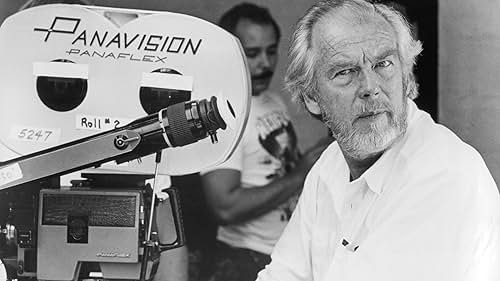
The Sacrifice Kino Classics from Kino Lorber – new 4K restoration Reviewed by: Harvey Karten Director: Andre Tartovsky Screenwriter: Andre Tartovsky Cinematography: Sven Nykvist Production Design: Anna Asp Costumes: Inger Pehrsson Editing: Andrei Tarkovsky, Michal Leszczylowski Cast: Erland Josephson, Susan Fleetwood, Allan Edwall, Guorún Gísladóttir, Sven Wollter, Valérie Mairesse, Filippa Franzén, Tommy Kjellqvist Screened at: […]
The post The Sacrifice Movie Review appeared first on Shockya.com.
The post The Sacrifice Movie Review appeared first on Shockya.com.
- 5/23/2018
- by Harvey Karten
- ShockYa
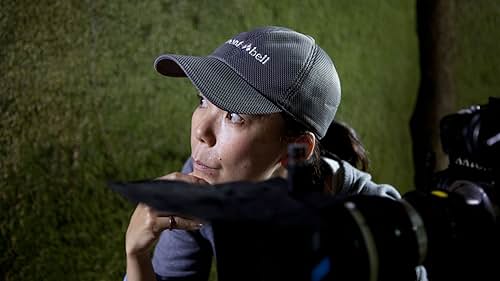
Naomi Kawase, Michael R Roskam, Noomi Rapace among attendees.
Danish drama Key House Mirror, directed by Michael Noer (R), will open the 2015 edition of the Göteborg Film Festival (Jan 23 - Feb 2).
Ghita Nørby and Sven Wollter play the lead roles in the drama about an elderly woman who strikes up an unexpected relationship with a fellow care-home resident.
Jorn Donner’s docu-biopic of Finnish designer Armi Ranta, Armi Alive!, will close the festival.
Eight Nordic films will compete for the $125,000 Nordic prize with this year’s jury comprising directors Pernille Fischer Christensen, Pirjo Honkasalo, Anja Breienand Benedikt Erlingsson, as well as actress Maryam Moghaddam.
The nominees are:
Key House Mirror by Michael NoerMy Skinny Sister by Sanna LenkenIn Your Arms by Samanou Acheche SahlstrømParis of the North by Hafsteinn Gunnar SigurðssonThey Have Escaped by Jukka-Pekka ValkeapääHomesick by Anne SewitskyUnderdog by Ronnie SandahlWomen in Oversized Men’s Shirts by Yngvild Sve FlikkeDebut prize
The Ingmar Bergman International Debut Award...
Danish drama Key House Mirror, directed by Michael Noer (R), will open the 2015 edition of the Göteborg Film Festival (Jan 23 - Feb 2).
Ghita Nørby and Sven Wollter play the lead roles in the drama about an elderly woman who strikes up an unexpected relationship with a fellow care-home resident.
Jorn Donner’s docu-biopic of Finnish designer Armi Ranta, Armi Alive!, will close the festival.
Eight Nordic films will compete for the $125,000 Nordic prize with this year’s jury comprising directors Pernille Fischer Christensen, Pirjo Honkasalo, Anja Breienand Benedikt Erlingsson, as well as actress Maryam Moghaddam.
The nominees are:
Key House Mirror by Michael NoerMy Skinny Sister by Sanna LenkenIn Your Arms by Samanou Acheche SahlstrømParis of the North by Hafsteinn Gunnar SigurðssonThey Have Escaped by Jukka-Pekka ValkeapääHomesick by Anne SewitskyUnderdog by Ronnie SandahlWomen in Oversized Men’s Shirts by Yngvild Sve FlikkeDebut prize
The Ingmar Bergman International Debut Award...
- 1/8/2015
- by [email protected] (Andreas Wiseman)
- ScreenDaily


Award-winning Danish director behind R and Nordvest to set new feature around a love story at an old people’s home.
Danish director Michael Noer, who set R in a prison and Nordvest in the criminal underworld, has chosen an old people’s home for the setting of his new feature Key House Mirror (Nøgle Hus Spejl).
The film will shoot from late next month for Nordisk Film Production and is being lined up to premiere in 2015.
Ghita Nørby – the grand lady of Danish film and stage – will star as a 76-year-old woman who moves into the home with her sick husband, only to meet the love of her life played by 80-year-old Swedish actor Sven Wollter.
Noer came up with the story for Danish writer Anders Frithiof August to script, and the Danish Film Institute has contributed $1.4m (Dkk 7.5m) for the Tomas Radoor and René Ezra production for Nordisk in collaboration with Danish pubcaster Dr TV.
“I...
Danish director Michael Noer, who set R in a prison and Nordvest in the criminal underworld, has chosen an old people’s home for the setting of his new feature Key House Mirror (Nøgle Hus Spejl).
The film will shoot from late next month for Nordisk Film Production and is being lined up to premiere in 2015.
Ghita Nørby – the grand lady of Danish film and stage – will star as a 76-year-old woman who moves into the home with her sick husband, only to meet the love of her life played by 80-year-old Swedish actor Sven Wollter.
Noer came up with the story for Danish writer Anders Frithiof August to script, and the Danish Film Institute has contributed $1.4m (Dkk 7.5m) for the Tomas Radoor and René Ezra production for Nordisk in collaboration with Danish pubcaster Dr TV.
“I...
- 3/17/2014
- by [email protected] (Jorn Rossing Jensen)
- ScreenDaily
The Sacrifice (1986) Direction & Screenplay: Andrei Tarkovsky Cast: Erland Josephson, Susan Fleetwood, Tommy Kjellqvist, Allan Edwall, Gudún S. Gísladóttir, Sven Wollter, Valérie Mairesse By Dan Schneider of Cosmoetica: Watching Russian filmmaker Andrei Tarkovsky’s final work, Offret / The Sacrifice (1986), is an exercise in cinema appreciation. That’s not because The Sacrifice is a great film, but because it has great moments interspersed with moments of sheer boredom. In fact, The Sacrifice is one of those rare films that goes to the antipodes of what is good and bad in that art form. Overall, it’s worth seeing; but it is in no way, shape, or [...]...
- 5/31/2010
- by Dan Schneider
- Alt Film Guide
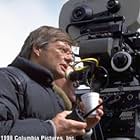
A Song for Martin

Bille August's "A Song for Martin" is the most wrenching of love stories, for the film intimately details the trauma a disease can have on a passionate marriage. The strength of the film lies in its two central performances by Sven Wollter as the stricken composer and Viveka Seldahl as his desperate violinist wife.
The film is better made than nearly all those disease-of-the-week telefilms. Nevertheless, this doesn't make it any easier to watch. What helps, though, along with those two striking performances, is the realization that love can triumph in unexpected ways.
Martin Fischer (Wollter), a leading Scandinavian composer and conductor, and Barbara Hartman (Seldahl), first violinist in a symphony orchestra, meet well past middle age, when both are married with grown children. They fall deeply in love and, throwing all social caution to the wind, shed their spouses and wind up in Morocco on a honeymoon.
Their home becomes a center not only for their own loving and feverish creativity -- she both inspires and helps with his compositions -- but also for family gatherings that express the sheer joy of life itself.
Then Martin is struck by Alzheimer's disease. As the ugly disease tears away his identity and memory, the two initially fight the illness. He struggles to continue with his work and hide the symptoms, while she tries to maintain their life and cling to the man she married.
Then a change comes over Martin: He resists those who care for him, especially Barbara, and seemingly wants to plunge into his new "identity." Later, she comes to realize that these nasty quarrels and confrontations are her husband's last loving gift to her: He needs to push her into a new life without him and the physical demands of his care.
Wollter possesses an expressive face that is alive with intelligence and warmth in the early phases of the movie, then grows increasingly bewildered and lost as the disease takes its toll. His graceful body gradually sags into itself, a moving symbol of his inner collapse.
Seldahl goes through an even greater transition, from unspeakably happy love to fierce determination to fight the illness, then anger, sadness and finally resignation. One senses her inner struggle, the uncertainty over what course of action is best as she must act as a mother to her own husband.
To create the couple's many moments of crisis, though, August, who bases his script on Ulla Isaksson's novel, allows his heroine to act with almost foolish disregard for her husband's condition. The episodes of her leaving him alone, taking him out into the ocean and subjecting him to public appearances when he is long past such exercises make her at times almost unsympathetic.
August has created an impressive chamber work with this "Song". The pacing could have been a little quicker, as there is more than a little repetition here. But the duet at its heart has moments of melancholy lyricism. And kudos to composer Stefan Nilsson, who has penned several splendid concertos that stand for Martin's work.
A SONG FOR MARTIN
Moonlight Filmproduction
and Svenska Filmkompaniet AB
Producers: Lars Kolvig, Michael Obel
Screenwriter-director: Bille August
Based on the novel by: Ulla Isaksson
Director of photography: Jorgen Persson
Production designer: Anna Asp
Music: Stefan Nilsson
Costume designer: Katarina Kvist
Editor: Janus Billeskov Jansen
Color/stereo
Cast:
Martin: Sven Wollter
Barbara: Viveka Seldahl
Biederman: Reine Brfynolfsson
Elisabeth: Lisa Werlinder
Karin: Linda Kallgren
Running time -- 118 minutes
No MPAA rating...
The film is better made than nearly all those disease-of-the-week telefilms. Nevertheless, this doesn't make it any easier to watch. What helps, though, along with those two striking performances, is the realization that love can triumph in unexpected ways.
Martin Fischer (Wollter), a leading Scandinavian composer and conductor, and Barbara Hartman (Seldahl), first violinist in a symphony orchestra, meet well past middle age, when both are married with grown children. They fall deeply in love and, throwing all social caution to the wind, shed their spouses and wind up in Morocco on a honeymoon.
Their home becomes a center not only for their own loving and feverish creativity -- she both inspires and helps with his compositions -- but also for family gatherings that express the sheer joy of life itself.
Then Martin is struck by Alzheimer's disease. As the ugly disease tears away his identity and memory, the two initially fight the illness. He struggles to continue with his work and hide the symptoms, while she tries to maintain their life and cling to the man she married.
Then a change comes over Martin: He resists those who care for him, especially Barbara, and seemingly wants to plunge into his new "identity." Later, she comes to realize that these nasty quarrels and confrontations are her husband's last loving gift to her: He needs to push her into a new life without him and the physical demands of his care.
Wollter possesses an expressive face that is alive with intelligence and warmth in the early phases of the movie, then grows increasingly bewildered and lost as the disease takes its toll. His graceful body gradually sags into itself, a moving symbol of his inner collapse.
Seldahl goes through an even greater transition, from unspeakably happy love to fierce determination to fight the illness, then anger, sadness and finally resignation. One senses her inner struggle, the uncertainty over what course of action is best as she must act as a mother to her own husband.
To create the couple's many moments of crisis, though, August, who bases his script on Ulla Isaksson's novel, allows his heroine to act with almost foolish disregard for her husband's condition. The episodes of her leaving him alone, taking him out into the ocean and subjecting him to public appearances when he is long past such exercises make her at times almost unsympathetic.
August has created an impressive chamber work with this "Song". The pacing could have been a little quicker, as there is more than a little repetition here. But the duet at its heart has moments of melancholy lyricism. And kudos to composer Stefan Nilsson, who has penned several splendid concertos that stand for Martin's work.
A SONG FOR MARTIN
Moonlight Filmproduction
and Svenska Filmkompaniet AB
Producers: Lars Kolvig, Michael Obel
Screenwriter-director: Bille August
Based on the novel by: Ulla Isaksson
Director of photography: Jorgen Persson
Production designer: Anna Asp
Music: Stefan Nilsson
Costume designer: Katarina Kvist
Editor: Janus Billeskov Jansen
Color/stereo
Cast:
Martin: Sven Wollter
Barbara: Viveka Seldahl
Biederman: Reine Brfynolfsson
Elisabeth: Lisa Werlinder
Karin: Linda Kallgren
Running time -- 118 minutes
No MPAA rating...
- 7/8/2004
- The Hollywood Reporter - Movie News
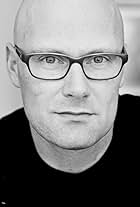
Kira's Reason

NEW YORK -- Actress Stine Stengade makes emotional instability seem downright sexy in this Danish import, the latest film to subscribe to the "Dogma" ethos.
The tale of a mentally ill young woman returning home after a stint in a psychiatric hospital, "Kira's Reason: A Love Story" is an intense but ultimately emotionally unfulfilling film made notable chiefly by Stengade's compellingly showy performance. The film opens today exclusively at New York's Quad Cinema.
Stengade, making her feature debut, stars as Kira, a beautiful thirtysomething woman with a handsome, well-heeled husband, Mads (Lars Mikkelsen), two good-looking children and a comfortable upscale home. She also suffers from an unspecified psychiatric disorder that lands her in a mental hospital.
It becomes apparent soon after her release that she has not been entirely cured, as evidenced by a series of incidents in which her erratic behavior lands her into trouble, after which she has to be retrieved by her patient, though sexually unfaithful, husband. These range from her jumping into a children's pool and acting rambunctious to picking up a stranger at a bar and going home with him. Later, Mads inexplicably puts her in charge of a dinner party for his business associates, with predictably chaotic results.
The film never particularly achieves any depth or resonance and ultimately comes across as a series of wacky, albeit rather disturbing episodes. That it works to the extent that it does is due to the immediacy of Ole Christian Madsen's helming and the editing of Soren B. Ebbe, who apparently gleaned the film's running time of 94 minutes from some 120 hours of video footage.
The two leads deliver highly committed and powerful performances, with Stengade's striking beauty making her character's emotional volatility even more mesmerizing. Veteran Swedish actor Sven Wollter (the star of the recent "A Song for Martin"), also delivers a strong supporting turn as Kira's father.
KIRA'S REASON: A LOVE STORY
First Run Features
Credits:
Director: Ole Christian Madsen
Screenwriters: Ole Christian Madsen in collaboration with Mogens Rukov
Producers: Morten Kaufmann, Bo Ehrhardt
Director of photography: Jorgen Johansson
Editor: Soran B. Ebbe
Music: Oyvind Ougaard, Cesar Berti
Cast:
Kira: Stine Stengade
Mads: Lars Mikkelsen
Kira's Father: Sven Wollter
Kay: Peaches Latrice Petersen
Charlotte: Camilla Bendix
Running time -- 94 minutes
No MPAA rating...
The tale of a mentally ill young woman returning home after a stint in a psychiatric hospital, "Kira's Reason: A Love Story" is an intense but ultimately emotionally unfulfilling film made notable chiefly by Stengade's compellingly showy performance. The film opens today exclusively at New York's Quad Cinema.
Stengade, making her feature debut, stars as Kira, a beautiful thirtysomething woman with a handsome, well-heeled husband, Mads (Lars Mikkelsen), two good-looking children and a comfortable upscale home. She also suffers from an unspecified psychiatric disorder that lands her in a mental hospital.
It becomes apparent soon after her release that she has not been entirely cured, as evidenced by a series of incidents in which her erratic behavior lands her into trouble, after which she has to be retrieved by her patient, though sexually unfaithful, husband. These range from her jumping into a children's pool and acting rambunctious to picking up a stranger at a bar and going home with him. Later, Mads inexplicably puts her in charge of a dinner party for his business associates, with predictably chaotic results.
The film never particularly achieves any depth or resonance and ultimately comes across as a series of wacky, albeit rather disturbing episodes. That it works to the extent that it does is due to the immediacy of Ole Christian Madsen's helming and the editing of Soren B. Ebbe, who apparently gleaned the film's running time of 94 minutes from some 120 hours of video footage.
The two leads deliver highly committed and powerful performances, with Stengade's striking beauty making her character's emotional volatility even more mesmerizing. Veteran Swedish actor Sven Wollter (the star of the recent "A Song for Martin"), also delivers a strong supporting turn as Kira's father.
KIRA'S REASON: A LOVE STORY
First Run Features
Credits:
Director: Ole Christian Madsen
Screenwriters: Ole Christian Madsen in collaboration with Mogens Rukov
Producers: Morten Kaufmann, Bo Ehrhardt
Director of photography: Jorgen Johansson
Editor: Soran B. Ebbe
Music: Oyvind Ougaard, Cesar Berti
Cast:
Kira: Stine Stengade
Mads: Lars Mikkelsen
Kira's Father: Sven Wollter
Kay: Peaches Latrice Petersen
Charlotte: Camilla Bendix
Running time -- 94 minutes
No MPAA rating...
- 1/17/2003
- The Hollywood Reporter - Movie News

A Song for Martin

Bille August's "A Song for Martin" is the most wrenching of love stories, for the film intimately details the trauma a disease can have on a passionate marriage. The strength of the film lies in its two central performances by Sven Wollter as the stricken composer and Viveka Seldahl as his desperate violinist wife.
The film is better made than nearly all those disease-of-the-week telefilms. Nevertheless, this doesn't make it any easier to watch. What helps, though, along with those two striking performances, is the realization that love can triumph in unexpected ways.
Martin Fischer (Wollter), a leading Scandinavian composer and conductor, and Barbara Hartman (Seldahl), first violinist in a symphony orchestra, meet well past middle age, when both are married with grown children. They fall deeply in love and, throwing all social caution to the wind, shed their spouses and wind up in Morocco on a honeymoon.
Their home becomes a center not only for their own loving and feverish creativity -- she both inspires and helps with his compositions -- but also for family gatherings that express the sheer joy of life itself.
Then Martin is struck by Alzheimer's disease. As the ugly disease tears away his identity and memory, the two initially fight the illness. He struggles to continue with his work and hide the symptoms, while she tries to maintain their life and cling to the man she married.
Then a change comes over Martin: He resists those who care for him, especially Barbara, and seemingly wants to plunge into his new "identity." Later, she comes to realize that these nasty quarrels and confrontations are her husband's last loving gift to her: He needs to push her into a new life without him and the physical demands of his care.
Wollter possesses an expressive face that is alive with intelligence and warmth in the early phases of the movie, then grows increasingly bewildered and lost as the disease takes its toll. His graceful body gradually sags into itself, a moving symbol of his inner collapse.
Seldahl goes through an even greater transition, from unspeakably happy love to fierce determination to fight the illness, then anger, sadness and finally resignation. One senses her inner struggle, the uncertainty over what course of action is best as she must act as a mother to her own husband.
To create the couple's many moments of crisis, though, August, who bases his script on Ulla Isaksson's novel, allows his heroine to act with almost foolish disregard for her husband's condition. The episodes of her leaving him alone, taking him out into the ocean and subjecting him to public appearances when he is long past such exercises make her at times almost unsympathetic.
August has created an impressive chamber work with this "Song". The pacing could have been a little quicker, as there is more than a little repetition here. But the duet at its heart has moments of melancholy lyricism. And kudos to composer Stefan Nilsson, who has penned several splendid concertos that stand for Martin's work.
A SONG FOR MARTIN
Moonlight Filmproduction
and Svenska Filmkompaniet AB
Producers: Lars Kolvig, Michael Obel
Screenwriter-director: Bille August
Based on the novel by: Ulla Isaksson
Director of photography: Jorgen Persson
Production designer: Anna Asp
Music: Stefan Nilsson
Costume designer: Katarina Kvist
Editor: Janus Billeskov Jansen
Color/stereo
Cast:
Martin: Sven Wollter
Barbara: Viveka Seldahl
Biederman: Reine Brfynolfsson
Elisabeth: Lisa Werlinder
Karin: Linda Kallgren
Running time -- 118 minutes
No MPAA rating...
The film is better made than nearly all those disease-of-the-week telefilms. Nevertheless, this doesn't make it any easier to watch. What helps, though, along with those two striking performances, is the realization that love can triumph in unexpected ways.
Martin Fischer (Wollter), a leading Scandinavian composer and conductor, and Barbara Hartman (Seldahl), first violinist in a symphony orchestra, meet well past middle age, when both are married with grown children. They fall deeply in love and, throwing all social caution to the wind, shed their spouses and wind up in Morocco on a honeymoon.
Their home becomes a center not only for their own loving and feverish creativity -- she both inspires and helps with his compositions -- but also for family gatherings that express the sheer joy of life itself.
Then Martin is struck by Alzheimer's disease. As the ugly disease tears away his identity and memory, the two initially fight the illness. He struggles to continue with his work and hide the symptoms, while she tries to maintain their life and cling to the man she married.
Then a change comes over Martin: He resists those who care for him, especially Barbara, and seemingly wants to plunge into his new "identity." Later, she comes to realize that these nasty quarrels and confrontations are her husband's last loving gift to her: He needs to push her into a new life without him and the physical demands of his care.
Wollter possesses an expressive face that is alive with intelligence and warmth in the early phases of the movie, then grows increasingly bewildered and lost as the disease takes its toll. His graceful body gradually sags into itself, a moving symbol of his inner collapse.
Seldahl goes through an even greater transition, from unspeakably happy love to fierce determination to fight the illness, then anger, sadness and finally resignation. One senses her inner struggle, the uncertainty over what course of action is best as she must act as a mother to her own husband.
To create the couple's many moments of crisis, though, August, who bases his script on Ulla Isaksson's novel, allows his heroine to act with almost foolish disregard for her husband's condition. The episodes of her leaving him alone, taking him out into the ocean and subjecting him to public appearances when he is long past such exercises make her at times almost unsympathetic.
August has created an impressive chamber work with this "Song". The pacing could have been a little quicker, as there is more than a little repetition here. But the duet at its heart has moments of melancholy lyricism. And kudos to composer Stefan Nilsson, who has penned several splendid concertos that stand for Martin's work.
A SONG FOR MARTIN
Moonlight Filmproduction
and Svenska Filmkompaniet AB
Producers: Lars Kolvig, Michael Obel
Screenwriter-director: Bille August
Based on the novel by: Ulla Isaksson
Director of photography: Jorgen Persson
Production designer: Anna Asp
Music: Stefan Nilsson
Costume designer: Katarina Kvist
Editor: Janus Billeskov Jansen
Color/stereo
Cast:
Martin: Sven Wollter
Barbara: Viveka Seldahl
Biederman: Reine Brfynolfsson
Elisabeth: Lisa Werlinder
Karin: Linda Kallgren
Running time -- 118 minutes
No MPAA rating...
- 9/19/2001
- The Hollywood Reporter - Movie News
'Twice Upon a Time'
Casanova gets his comeuppance in ''Twice Upon a Time, '' a melodrama of failed relationships by Norwegian filmmaker Anja Brejen. Part of Women in Film and the American Film Institute's presentation ''A Festival of Women Directors, '' the feature traces the undoing of a modern-day Lothario from his own highly limited perspective, a strategy that ensures that the audience will always be one or two emotional steps ahead of the poor sap.
Not only does this ensure the audience can adopt a smugly superior position to the hero, but that the film will unwind in a series of predictable revelations. For the doggedly dedicated cineaste only, this feature appears limited to the festival circuit. It screens Sunday at 2:30 p.m. at the AFI.
The philanderer is Jan (Sven Wollter), a successful, good-looking, middle-aged theatrical designer who has enjoyed a life of unbridled success with women. However, the lovers in his life are beginning to toss him aside for more stable relationships, and when he plots a strategic retreat to the arms of his only mildly estranged wife, Lillian (Kjersti Holmen), he discovers to his horror that not only has she come to grips with life without him -- a discovery she cruelly confirms by bedding him down one last time -- but has begun to consider spending it with another man.
Most of the first half of the film consists of Jan getting dressed down, one way or another, by the various women he knows, until finally he goes a little off his rocker. Collecting a shotgun, he takes a room in the old student digs where he and his wife first cohabited, and which is now conveniently a sniper's window across the way from her new lover's apartment.
From then on it's a should-I-or-shouldn't-I battle, somewhat enlivened by his comically surreptitious attempts to retrieve a necklace he had coveted in his youth from its new owner, the Egyptian ambassador to Norway.
The film might have appeared bright and satiric a while ago, but now its one-way indictment plays like a stacked deck. After all, why did all these suddenly enlightened women collapse into this lowdown wolf's arms in the first place?
To investigate that would tip the judgment away from its preordained verdict, and though Brejen grabs for a surprise emotional reversal at the end, its sweet potential is ruined by the sour lead-in.
TWICE UPON A TIME
Norsk Film A/S, the Swedish Film Institute, the Danish Film Institute, Nordic Film & TV A/S
Director Anja Brejen
Producer Gunnar Svensrud
Writers Anja Brejen, Carl Martin Borgen
Cinematographer Philip Ogaard
Editor Einar Egeland
Music Jan Garbarek
Color
Cast:
Jan Sven Wollter
Lillian Kjersti Holmen
Running time -- 90 minutes
No MPAA rating
(c) The Hollywood Reporter...
Not only does this ensure the audience can adopt a smugly superior position to the hero, but that the film will unwind in a series of predictable revelations. For the doggedly dedicated cineaste only, this feature appears limited to the festival circuit. It screens Sunday at 2:30 p.m. at the AFI.
The philanderer is Jan (Sven Wollter), a successful, good-looking, middle-aged theatrical designer who has enjoyed a life of unbridled success with women. However, the lovers in his life are beginning to toss him aside for more stable relationships, and when he plots a strategic retreat to the arms of his only mildly estranged wife, Lillian (Kjersti Holmen), he discovers to his horror that not only has she come to grips with life without him -- a discovery she cruelly confirms by bedding him down one last time -- but has begun to consider spending it with another man.
Most of the first half of the film consists of Jan getting dressed down, one way or another, by the various women he knows, until finally he goes a little off his rocker. Collecting a shotgun, he takes a room in the old student digs where he and his wife first cohabited, and which is now conveniently a sniper's window across the way from her new lover's apartment.
From then on it's a should-I-or-shouldn't-I battle, somewhat enlivened by his comically surreptitious attempts to retrieve a necklace he had coveted in his youth from its new owner, the Egyptian ambassador to Norway.
The film might have appeared bright and satiric a while ago, but now its one-way indictment plays like a stacked deck. After all, why did all these suddenly enlightened women collapse into this lowdown wolf's arms in the first place?
To investigate that would tip the judgment away from its preordained verdict, and though Brejen grabs for a surprise emotional reversal at the end, its sweet potential is ruined by the sour lead-in.
TWICE UPON A TIME
Norsk Film A/S, the Swedish Film Institute, the Danish Film Institute, Nordic Film & TV A/S
Director Anja Brejen
Producer Gunnar Svensrud
Writers Anja Brejen, Carl Martin Borgen
Cinematographer Philip Ogaard
Editor Einar Egeland
Music Jan Garbarek
Color
Cast:
Jan Sven Wollter
Lillian Kjersti Holmen
Running time -- 90 minutes
No MPAA rating
(c) The Hollywood Reporter...
- 11/15/1991
- The Hollywood Reporter - Movie News
IMDb.com, Inc. takes no responsibility for the content or accuracy of the above news articles, Tweets, or blog posts. This content is published for the entertainment of our users only. The news articles, Tweets, and blog posts do not represent IMDb's opinions nor can we guarantee that the reporting therein is completely factual. Please visit the source responsible for the item in question to report any concerns you may have regarding content or accuracy.
